
Algeria, officially the People's Democratic Republic of Algeria, is a country in the Maghreb region of North Africa. The capital and most populous city is Algiers, located in the far north of the country on the Mediterranean coast. With an area of 2,381,741 square kilometres (919,595 sq mi), Algeria is the tenth-largest country in the world, and the largest by area in the African Union and the Arab world. With an estimated population of over 44 million, it is the ninth-most populous country in Africa.
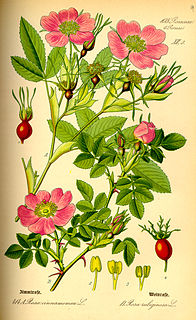
Rosales is an order of flowering plants. It is sister to a clade consisting of Fagales and Cucurbitales. It contains about 7,700 species, distributed into about 260 genera. Rosales comprise nine families, the type family being the rose family, Rosaceae. The largest of these families are Rosaceae (90/2500) and Urticaceae (54/2600). The order Rosales is divided into three clades that have never been assigned a taxonomic rank. The basal clade consists of the family Rosaceae; another clade consists of four families, including Rhamnaceae; and the third clade consists of the four urticalean families.

Rosaceae, the rose family, is a medium-sized family of flowering plants, including 4,828 known species in 91 genera.
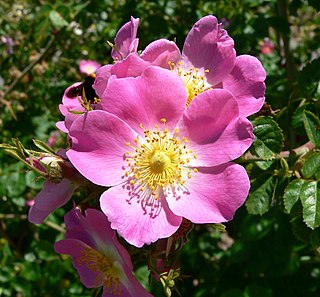
A rose is a woody perennial flowering plant of the genus Rosa, in the family Rosaceae, or the flower it bears. There are over three hundred species and tens of thousands of cultivars. They form a group of plants that can be erect shrubs, climbing, or trailing, with stems that are often armed with sharp prickles. Flowers vary in size and shape and are usually large and showy, in colours ranging from white through yellows and reds. Most species are native to Asia, with smaller numbers native to Europe, North America, and northwestern Africa. Species, cultivars and hybrids are all widely grown for their beauty and often are fragrant. Roses have acquired cultural significance in many societies. Rose plants range in size from compact, miniature roses, to climbers that can reach seven meters in height. Different species hybridize easily, and this has been used in the development of the wide range of garden roses.

The Algerian War, also known as the Algerian Revolution or the Algerian War of Independence, and sometimes in Algeria as the War of 1 November, was fought between France and the Algerian National Liberation Front from 1954 to 1962, which led to Algeria winning its independence from France. An important decolonization war, it was a complex conflict characterized by guerrilla warfare and the use of torture. The conflict also became a civil war between the different communities and within the communities. The war took place mainly on the territory of Algeria, with repercussions in metropolitan France.
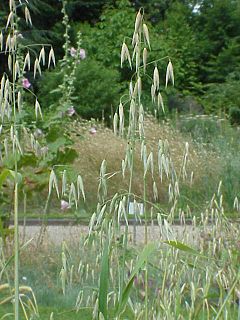
Avena is a genus of Eurasian and African plants in the grass family. Collectively known as the oats, they include some species which have been cultivated for thousands of years as a food source for humans and livestock. They are widespread throughout Europe, Asia and northwest Africa. Several species have become naturalized in many parts of the world, and are regarded as invasive weeds where they compete with crop production. All oats have edible seeds, though they are small and hard to harvest in most species.

Poa pratensis, commonly known as Kentucky bluegrass, smooth meadow-grass, or common meadow-grass, is a perennial species of grass native to practically all of Europe, North Asia and the mountains of Algeria and Morocco. Although the species is spread over all of the cool, humid parts of the United States, it is not native to North America. The Spanish Empire brought the seeds of Kentucky bluegrass to the New World in mixtures with other grasses. Poa pratensis forms a valuable pasture plant, characteristic of well-drained, fertile soil. It is also used for making lawns in parks and gardens and is common in cool moist climates like the Pacific Northwest, and Northeastern United States. When found on native grasslands in Canada, however, it is considered an unwelcome exotic plant, and is indicative of a disturbed and degraded landscape.

Chadli Bendjedid was the third President of Algeria; his presidential term of office ran from 9 February 1979 to 11 January 1992.

Cinsaut or Cinsault is a red wine grape, whose heat tolerance and productivity make it important in Languedoc-Roussillon and the former French colonies of Algeria, Lebanon and Morocco. It is often blended with grapes such as Grenache and Carignan to add softness and bouquet.
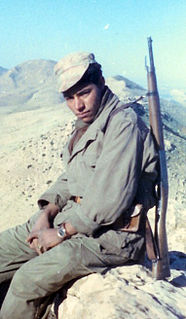
Harki is the generic term for native Muslim Algerians who served as auxiliaries in the French Army during the Algerian War of Independence from 1954 to 1962. The word sometimes applies to all Algerian Muslims who supported French Algeria during the war. The motives for enlisting in the Harkis were mixed. They are regarded as traitors in Algeria and thousands were killed after the war in reprisals despite the Évian Accords ceasefire and amnesty stipulations.

Dictynidae is a family of cribellate, hackled band-producing spiders first described by Octavius Pickard-Cambridge in 1871. Most build irregular webs on or near the ground, creating a tangle of silken fibers among several branches or stems of one plant.
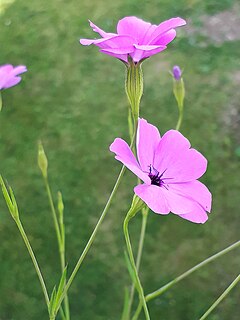
Eudianthe coeli-rosa, called the rose of heaven, is a flowering plant in the family Caryophyllaceae, native to the Canary Islands, Morocco, Algeria, Tunisia, Libya, Portugal, Spain, France, and Italy. An annual, it is grown in gardens as an ornamental.

The Battle of Algiers is a 1966 Italian-Algerian historical war film co-written and directed by Gillo Pontecorvo and starring Jean Martin and Saadi Yacef. It is based on events by rebels during the Algerian War (1954–1962) against the French government in North Africa; the most prominent being the titular Battle of Algiers, the capital of Algeria. It was shot on location and the film's score was composed by Ennio Morricone. The film was shot in a Roberto Rossellini-inspired newsreel style: in black and white with documentary-type editing to add to its sense of historical authenticity, with mostly non-professional actors who had lived through the real battle. It is often associated with Italian neorealist cinema.

Helictotrichon, or alpine oatgrass, is a genus of perennial flowering plants in the grass family. The genus name comes from the Greek heliktos meaning twisted, and trichos meaning spine, referring to the shape of the awn.
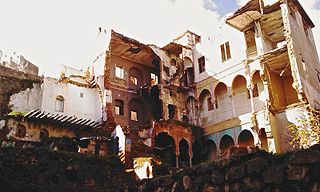
The Battle of Algiers was a campaign of urban guerrilla warfare carried out by the National Liberation Front (FLN) against the French Algerian authorities from late 1956 to late 1957. The conflict began as a series of attacks by the FLN against the French forces followed by a terrorist attack on Algerian civilians in Algiers by a group of Pieds-Noirs, aided by the police. Reprisals followed and the violence escalated leading the French Governor-General to deploy the French Army in Algiers to suppress the FLN. Civilian authorities left all prerogatives to General Jacques Massu who, operating outside legal frameworks between January and September 1957, successfully eliminated the FLN from Algiers. The use of torture, forced disappearances and illegal executions by the French later caused controversy in France.

The In Amenas hostage crisis began on 16 January 2013, when al-Qaeda-linked terrorists affiliated with a brigade led by Mokhtar Belmokhtar took expat hostages at the Tigantourine gas facility near In Amenas, Algeria. One of Belmokhtar's senior lieutenants, Abdul al Nigeri, led the attack and was among the terrorists killed. After four days, the Algerian special forces raided the site, in an effort to free the hostages.
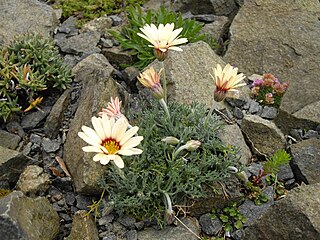
Rhodanthemum syn. Chrysanthemopsis, Pyrethropsis, is a genus of flowering plants in the family Asteraceae, mostly native to exposed rocky places in Northern Africa. Formerly included in either Chrysanthemum or Leucanthemum, the 10 or 15 species of Rhodanthemum display many similarities to their former congeners, with composite daisy-like flowers. They are mat-forming, prostrate perennials or subshrubs, and some are cultivated as ornamental plants.

Drinking water supply and sanitation in Algeria is characterized by achievements and challenges. Among the achievements is a substantial increase in the amount of drinking water supplied from reservoirs, long-distance water transfers and desalination at a low price to consumers, thanks to the country's substantial oil and gas revenues. These measures increased per capita water supply despite a rapidly increasing population. Another achievement is the transition from intermittent to continuous water supply in the capital Algiers in 2011, along with considerable improvements in wastewater treatment resulting in better water quality at beaches. These achievements were made possible through a public-private partnership with a private French water company. The number of wastewater treatment plants throughout the country increased rapidly from only 18 in 2000 to 113 in 2011, with 96 more under construction. However, there are also many challenges. One of them is poor service quality in many cities outside Algiers with 78% of urban residents suffering from intermittent water supply. Another challenge is the pollution of water resources. There has also been insufficient progress concerning reuse of treated water, a government priority in this dry country.
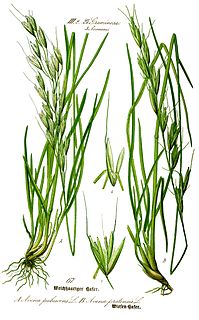
Avenula is a genus of Eurasian flowering plants in the grass family. Over 100 names have been proposed for species, subspecies, varieties, and other infraspecific taxa within Avenula, but only one species is accepted. The others names are all regarded as synonyms of other accepted names. The only recognized species in the genus is Avenula pubescens, commonly known as downy oat-grass or downy alpine oatgrass, native to Europe and Asia from Iceland and Portugal to Xinjiang, Mongolia, and Siberia. It is also naturalized in scattered locations in North America, in states as Connecticut, Delaware, Minnesota, New Jersey and Vermont, and in Canadian provinces such as Alberta, Manitoba, Ontario, Quebec, and Saskatchewan.

















